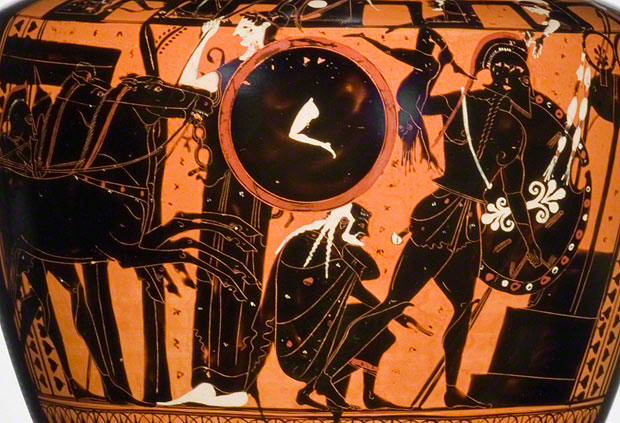Antiwar Poem Bitter Honey by Steven J. Willett

Siege of Troy that depicts from the left a violent horse chariot breaking through a gate, Athena urging them to ravage the Trojans, King Priam crouching in defeat, a warrior who killed Hector’s child Astyanax throwing the bloody corpse over the city walls and a tripod showing the chaos in a supposedly sacred place. Terracotta c. 520~500BC kydia attributed to the Leagos Group, Staatliche Antikensammlung und Glyptothek, München
Note: The following is one of several antiwar poems in my book of original poetry that will be published at the end of this year or early next depending on the editor’s schedule. All my poetic translations–which keep growing beyond plan–will go into a second volume. I thought it more appropriate to provide a poem that reflects my own view rather than that of a former poet.
Bodies fill graves, graves grow honeycomb, earth rests lightly on its sodden cells, time swells bones broken to pollen, death's redolence, leaving nothing behind but bitter honey. Only the dead know how to taste bitter honey, the taste that restores their strangled cries. For a moment the cries are melodious with loss, then silence wrings their voices again. Dig deeper. Beneath the graves lie even more ancient bodies hardening into rock. Time layers the sediments, strata crack, bend and rupture under memory's fire. Millennia on millennia of erosion expose petrified amnesia. Wind, sun and moon now pass serenely over indecipherable fossils waiting For bodies to grow into armies, fill graves and join their amnesty of memory.
Bitter Lemon was published in Better Than Starbucks Journal February 2021, Vol VI, No. I as one of four leading poems for emphasis.

Thanks Steven..
A though provoking poem. A few daunting lines within; as well there should be.
Good wishes for your future sojourn.
rw
This is a poignant parting gift — thank you.
Thank you for sharing your work both as a translator and as an original poet. I and I am sure others here are looking forward to reading more of your posts in the future.
Travel safely, and enjoy your time back in the States.
To me, this poem is remarkable in its rhythm and melody. Milton’s “the curse of rhyme” is avoided. It reminds me of Medieval poetry (like the Pearl Poet), where alliteration and assonance were the primary means of revealing and expressing the poem’s logical structure.
Excellent.
Thanks very much. Poetry is the pathway to reality